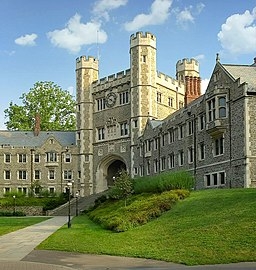You have /5 articles left.
Sign up for a free account or log in.

Princeton University
Jazz-Face/ CC BY-SA2.0DE Wikipedia
Soon after Princeton University president Christopher L. Eisgruber outlined steps the university would take “to combat systemic racism at Princeton and beyond,” the U.S. Department of Education declared his message a “serious, even shocking” admission, which “compel[led] the Department to move with all appropriate speed” to investigate the institution for possible violations of federal antidiscrimination law.
The department’s Orwellian reading of Eisgruber’s statement is part of a broader effort by the Trump administration to flip the national dialogue on race, history and education.
Title VI of the Civil Rights Act of 1964, the law cited by the department in its letter to Princeton, prohibits discrimination in “any program or activity receiving Federal financial assistance.” Eisgruber’s acknowledgment that racism continues to harm people of color at Princeton, the department maintains, must mean that the university’s past assurances that it does not discriminate were false -- rendering the institution potentially liable for the return of over $75 million in federal funding, and subject to fines and other penalties.
The department appears to believe that discrimination on college campuses was legislated out of existence in 1964, and that any acknowledgment of its continued impact or the adoption of “race-based ‘diversity’ measures” amounts to an admission of discrimination. In short, to acknowledge racism and try to do something about it is to confess guilt.
In the aftermath of George Floyd’s killing this summer and the subsequent Black Lives Matter protests, colleges and universities across the United States issued statements similar to Eisgruber’s. For that matter, many of the country’s most prominent business leaders offered their own statements acknowledging the continuing impact of racism and promising to make their corporate cultures more inclusive. By the department’s logic, all are confessing to discrimination.
People of goodwill inside and outside academe may differ about how best to create an environment in which people of color feel valued, treated fairly and empowered; the extent to which hiring and admission practices should take into account race, ethnicity and gender; whether and how support for members of underrepresented communities should be augmented; and whether college curricula reflect unduly white, Eurocentric assumptions. But candid discussions of those issues, and reasonable steps to grapple with them, do not imply discrimination in violation of federal law. Until now, neither the courts nor the government have suggested that they do.
Unfortunately, the department’s investigation of Princeton is not an aberration. It is part of a concerted effort to insist on a narrative of American history that denies the existence of systemic racism and treats efforts to address it as unpatriotic and even illegal.
In a Constitution Day speech delivered at the National Archives, for example, President Trump denounced “decades of left-wing indoctrination in our schools,” attacked efforts to challenge traditional accounts of the nation’s founding and announced the formation of a “1776 Commission” to “restore patriotic education” and a National Endowment for the Humanities grant to develop a “pro-American curriculum that celebrates the truth about our nation’s great history.” The administration has also supported legal challenges to affirmative action at Harvard and Yale Universities and imposed new constraints on antiracism training at federal agencies.
There is ample room for legitimate debate on how to understand the coexistence of the country’s founding ideals with the institution of slavery, how the past should be seen in the context of contemporary values and how the impact of racism in America can best be addressed -- whether on campuses or in the broader society. Using the power of the federal government to impose a particular narrative that glosses over fundamental flaws in our society and its history undermines education, democracy and the search for truth.
Every country, of course, has its founding myths. But ignoring the sins of the past will not, as President Trump has implied, strengthen “the civic bonds that tie us together.” To the contrary, imposition of a sanitized, some would say whitewashed, history will, we fear, tear us apart. As William Faulkner noted, “The past is never dead. It's not even past.” We misuse it at our peril.








